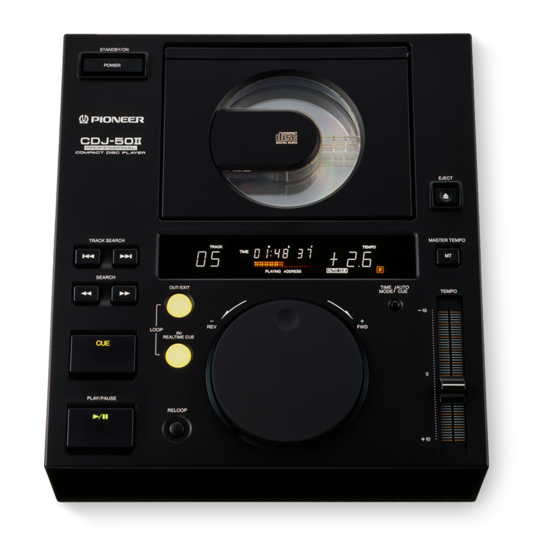Pioneer CDJ-500II Instrukcja serwisowa - Strona 2
Przeglądaj online lub pobierz pdf Instrukcja serwisowa dla Odtwarzacz CD Pioneer CDJ-500II. Pioneer CDJ-500II 6 stron. Compact disc player
Również dla Pioneer CDJ-500II: Instrukcja obsługi (16 strony)

CDJ-500II
1. SAFETY INFORMATION
This service manual is intended for qualified service technicians; it is not meant for the casual
do-it-yourselfer. Qualified technicians have the necessary test equipment and tools, and have been
trained to properly and safely repair complex products such as those covered by this manual.
Improperly performed repairs can adversely affect the safety and reliability of the product and may
void the warranty. If you are not qualified to perform the repair of this product properly and safely, you
should not risk trying to do so and refer the repair to a qualified service technician.
IMPORTANT
THIS PIONEER APPARATUS CONTAINS
LASER OF CLASS 1.
SERVICING OPERATION OF THE APPARATUS
S H O U L D B E D O N E B Y A S P E C I A L L Y
INSTRUTED PERSON.
LASER DIODE CHARACTERISTICS
MAXIMUM OUTPUT POWER: 5 mw
WAVELENGTH: 780 – 785 nm
LABEL CHECK
FRONT
No.3 (VRW1094)
No.4 (VRW1297)
2
Chassis
1. Laser Interlock Mechanism
right side
2. When the cover is opened, close viewing of the objective lens
∗
Refer to page 22 on the service manual RRV1831
Additional Laser Caution
ON/OFF switching of the switch for detecting loading state,
ON/OFF switching of the clamp completion, close comple-tion
and shutter switches are detected by the system micropro-
cessor. The design of this interlook mechanism prevents
laser diode oscillation when even one of the clamp completion,
close completion and shutter switches is OFF (High level).
Accordingly, the interlock will no longer function and the
laserdiode will oscillater if all three of these switcher are set
deliber-ately to ON(Low level).
The interlock also does not function in the test mode
Laser diode oscillation will continue, if pin 1 of M51593FP
(IC101) on the PRE AMP BOARD ASSY mounted on the
pickupassembly is connected to GND, or pin 19 is connected to
low level (ON), or else the terminals of Q101 are shorted to
each other (fault condition).
with the naked eye will cause exposure to a Class 1 laser
beam.
∗
.
